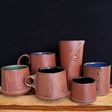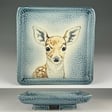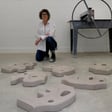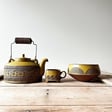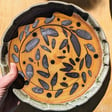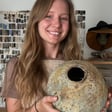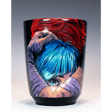Introduction to 'Shaping Your Pottery'
00:00:01
Speaker
If you love pottery and want to take your skills to the next level, you're in the right place. Find your own pottery style right here on Shaping Your Pottery with Nick Torres. Let's get started.
The Playfulness in Long-term Work
00:00:13
Speaker
And if you're in a long-term relationship with play and with your work, if it doesn't feel playful anymore, it can be draining.
Are Formal Degrees Necessary in Pottery Teaching?
00:00:26
Speaker
Laura, welcome to Shape Your Pottery and share with me what's a commonly held belief in pottery that you passionately disagree with. Yeah, I i thought about this one for a little while because I think I have a few.
00:00:38
Speaker
I think the 1st 1 is that. Like, an MFA or DFA is what makes you a good teacher. And the other side of it is, like, if you don't have a degree, you shouldn't be a teacher. And I think that that, I mean, of course, there's a time and a place for, like. Potentials like being in university, or whatever, like, at community studio. I think some of the best teachers are the people who. have recently learned, like in the last few years, and they can remember what it still feels like to be struggling through something more like figuring out handles. And, you know, I think the best teacher, the people who can empathize well with their students want to teach.
Misconceptions about the Pottery Profession
00:01:20
Speaker
and are, yeah, open to hanging out. And then I think another myth is that it's easy. Yes, I can hear that a lot of people come into your tent at like a market and they're like, oh my God, you're so lucky. Like, it must be so like wonderful. It's so magical that you're like big pots for a living. And a lot of the time, it's not mad or unfortunate. And I don't mean that just to be cynical. I just like, it's really hard to make a living from from pottery. And, you know, there's a lot of Instagram reels that will paint it as was like, you know, these people have these beautiful studios and like they're selling like perfect light. And it's it's, it's awesome. And it's great when people have that. But like, sometimes the first few years, like what we don't see is for those people, the first five years, they were a basin.
00:02:10
Speaker
or like say we're you know at a cutest like hustling in the community studio or trying to figure out like made some really weird work for a while and until they finally figure out what it is that you know what they feel good about like what they made well um so i think that it's easy i think that it's only for like pedigree artists and then the last side of that is that people who maybe didn't get a degree i think in this day and age sometimes it's good to cite where you did learn from so like if you did learn from a community studio or you did learn from another artist and it wasn't in a university setting like maybe being cautious about using the words like self-taught because I think that that also gives more power to so institution those institutions right because it says like you either get a degree traditional way or but or you don't have any you know oh you're self-taught and I think that the US we have such a great
00:03:06
Speaker
alternative school and craft school culture and that giving credit to those institutions, like places that you learn just feel exciting and cool and important.
Laura's Journey into Pottery
00:03:16
Speaker
wolf Those are my controversial opinions, I guess. Absolutely love it. So now tell me a story how you got started making pottery. Yeah, I learned that under the community studio, or sorry, at a community college. And I took a class after I was convinced that I wanted to do theater. Professionally, I moved to New York and auditioned everywhere and there was everything pretty quickly. But that wasn't what I wanted. It's like, came back to my hometown, like, George Community College there.
00:03:48
Speaker
I took a ceramic class and the first thing we did was pinchpaw and it was I wanted immediately. I think this is great. And then ever since I sort of just kept taking some classes at community college, I went to UW-Maine for the classes there. And fully like as I was getting further to finishing my degree, it would be there like get a teaching degree by so and stop taking ceramics or get a ceramics degree and then hope that you can also teach at some point. And I felt like I wouldn't be a very good teacher if I hadn't first figured out how to make well.
00:04:28
Speaker
And I didn't feel right with the time that I had spent on ceramics that I was making work that was worth teaching. So I stuck on and got a ceramics degree. And I'll now thank for it. I teach at commodity CEOs in Chicago. I get to do both, which is great. But that was where I fell in love. It was in community cards. Absolutely love a shaping nation focus on making the best possible work that you can possibly make and You're gonna think it for you're gonna be thankful later Yeah, and then you'll be able to hopefully help other people make their best work Because you know how to refine your own Absolutely great.
A Summer at the Watershed Ceramic Center
00:05:10
Speaker
So now can you tell me the story about when you attended the watershed ceramic center?
00:05:15
Speaker
Yeah, so I was really lucky that after undergrad, I my degree and I got accepted to go work there for a summer. So I actually like worked in their office, with like their intern type program. So you live there for the summer with a bunch of other like emerging or young artists like locally, shortly. Graduated is what I'm trying to say, budding new artists, I guess. And then you worked on the campus for the Hummer and through that whole season, you'd be introduced to like 200 or more established artists who were there for two weeks. They'd proposed their residency. They were making
00:05:55
Speaker
you know, pots or they had usually a theme for their residency and they would work together and then you could assist, you know, is as needed. And that was back before they did all the renovations. They had still a barn that you worked in this summer and it was the most charming, amazing time in Maine. And people in Maine really appreciated handmade pots. So there was this kind of enthusiasm for for pottery that I had. I had experience, of course, in a ceramics program, but I ah really fell in love, I think, with pottery during that summer. And I started making more pots as opposed to sculptures, which you're not going to realize. But no one's seen. there's like I have five friends that have seen the undergrad work. like
00:06:42
Speaker
Right of passage, right? Like you make the goofy
Learning from Experienced Artists
00:06:45
Speaker
stuff and you're the real ones now. Like the one kind, yeah. many of you Funny. Yep. I love the this. And so yeah, I think what I've said was I was super lucky to get to go there right from right from college and meet so many great people and kind of refine ref fine and find a new path for the work that I was making out of school. absolutely love it how did it how did your time here help elevate your own pottery yeah i think seeing and being able to hold refined pottery is like is so helpful um of course we can see pictures of stuff right and he can see but a picture only tells me so much like being able to watch um people establish like established artists make their work being able to watch
00:07:39
Speaker
the work come out of the channel and see how light it is and how, um you know, see the little details and see, um you know, maybe the clayness of it all. So, like, if there's a little crack, so there's a little finger mark. So, there's the way that clay, you know, records everything that we do and seeing that when it's allowed from somebody who's really well known and then allowing yourself that grace, too. Like, you know, your work doesn't have to be picture perfect. That your work can, it it should feel like a person made it, you know. I think being there and being around people who really knew what they were doing was just very insane. It felt attainable. like It felt like they've done it, so maybe I can too. I was also super lucky because this older artist came into my studio one day.
00:08:25
Speaker
And she was great. She was from New York, and her name was Linda Helen. I remember, so friends around her. Thanks, Linda. She was listening to, or she was hanging out. She became into my studio. and And she was like, you know, and because at the time I was like painting these tiny little, like, ridiculous patterns all over my my pieces and she was like you know that that seems like it takes you a long time. I was like it does and she was like do you enjoy what you're doing? I was like no it's like it's starting to feel kind of tedious and she's like well that's hard if you've just started doing it and she was like you know I think what you need to do is you need to simplify what you're doing a little bit and find something that you enjoy doing but do something that takes less time so you can charge a little more accessible price or price things more
00:09:11
Speaker
um and find that like happy balance between what people want to pay, what you want to make, and how much time it takes you to do that. And that was really good advice. And I think that being there allowed me to connect with people who just have just been doing, who've been making a living for our for much longer than I had even been thinking about art, you know? How does one, how can one simplify their own work, especially if they're making really more complicated work? Well, maybe, and that that might not be the path for everybody, right? Because for some people, like the complication is what's fun about it. And if the complication is what's fun about it, then why stop? But for me personally, I think she could tell that I was like, you know, so yeah nice you go like like why you
00:10:02
Speaker
hurting yourself, making these, like, doesn't make any sense. You know, I appreciated her, like, the directness of that, of just coming in and being like, kid, child,
Balancing Pottery Time and Pricing
00:10:11
Speaker
stop, you know, was great. But I think for some people, like, then if you get lost in in the process and you love making complicated things, then that's maybe, that is your path, you know, but I think for me, I was, it was too much. I was doing too much. I love that. Shaping Nation, sometimes the solution is to simplify what you're doing, not do as many things so that you can give yourself more time and to focus on other things in your pottery. I love that. So let's talk about your pottery. Can you tell me the story how you started making the pottery that you make today?
00:10:45
Speaker
Yeah, I think of that started at Watershed because I was i was making um i was making both pinched like graphic things, like I was playing with images and trying to put comics on pause, but then I was also so making more blocky colored patterns. And I think I was just like kind of refining not only the pattern, um but the fours as well, like how to have balance in clean form. And that's a quick five years. So five years. After spending time at Watershed in that five years, I got really lucky and was asked to do this at Hay Staff at the Clark Craft School again. And so there's a few weeks helping Emily Schroederwurst, who pinches up her whole practice. And she's incredible. She's a Chicago artist as well.
00:11:33
Speaker
And so spending time with Emery, Pinchy, and Kruegerweig, and hearing a little bit about how another artist approaches, you know, painting with wonderful. And then I've taken classes that took a painting class at the Anderson Ranch, you know, a scholarship to go there, and that was incredible. And I worked on writing a show, and we were doing watercolor painting, and that I think spending some time with just refining images and image made wool and karmic were huge, without the pottery aspect, but just spending time on paper was was great. I've taken a lot of classes, right? So I've taught school college and then teaching everything also helps you to be a better artist, because if you
00:12:20
Speaker
are doing. If you can do something, that's great. Can you do that thing? Describe it exactly what you're doing to a group of people who've never done it before and then still want to fire your demos at the end? you know like it's the having All of these experiences, like they're super lucky. it' theater peace I feel lucky it to continue you building community studios where these artists come through and offer workshops. so Then you just get to go to them because you're a teacher there too. you know so Running from right here, I did the class with John Britt. That was amazing. Running the glaze. Molly and Bishop came through and did a drawing workshop. The studio, the chat, she's moving.
00:13:03
Speaker
that a workshop at um Little Street into the class of him. So seeing a lot of different people's approaches um and then kind of refining your own practice and deciding like what's interesting within your own work, I think was pretty cool.
Inspiration from Narrative and Play
00:13:20
Speaker
Absolutely love that. I absolutely love that. So now, you are inspired by many things, but the two that stood out for me were you being inspired by narrative and play. Tell me more about this. Yeah, like the ne hi hi love here and what do I things that have happened and put them on top. Because podcasts last, we were classed by 10,000 people, right?
00:13:50
Speaker
and taking this silly thing that happened between me and my friend, or a memory, and painting it out, drawing it out, and then putting it on a piece helped not only to like remember it, so like I've gone through drawings later and been like, oh, I turned up. That thing happened, you know, that's funny. um But although it allows like, you have this pod, you can use this pod every day, and it's a memory. You know, I think that people And I mean, narrative is kind of like the human way, right? We all know storytelling, and that's a human being, a person. um We've done it. Every culture has its stories, and it's fabled, and I think that, you know, to have that is to have image-making and storytelling is a big part of teaching practice and comics and putting those comics on.
00:14:44
Speaker
ah Yeah, I forgot the other thing. Oh, to play. Play is so great because if you're in a long-term relationship with play and with your work, if it doesn't feel playful anymore, it can be draining. and When he do potter is is do the moment you the best way to hate something right is to make money or do and depend on it for income. um and So play for me, putting aside time where you're just kind of sketching, like clay sketching, putting not scoring anything, it's like building up. It leads to new ideas, but it also feels like you're sculpting part.
00:15:31
Speaker
And I think for me, it's I mean, for everyone, I'm sure it's really important just to help keep things fresh. And bouncing between processes is another way. Like it feels, things feel playful. Like if I'm tired of making pods, then I'll go screen print for a while. And if I'm tired of screen printing and I don't feel like I have anything to print, then I'll go draw for a while. If I'm not really feeling drawing, then sometimes it's just like go for a walk. but shit I don't know. We don't always have to be productive, but jumping between medium and playing with the same ideas is ah is a good way to keep things for me to keep things playful. I don't feel fun for doing yourself and having fun.
00:16:14
Speaker
absolutely love that. Shaping Nation, you have to incorporate play into your work by that means doing another art medium, taking it a walk or doing something completely different with your pottery. Incorporate play because that's how you're going to keep yourself sane. So something interesting I found from your website is you hope to respect the material and continue to run the complexity of connection. Can you tell me more So, I'm taught in Canadian Studio.
Connecting with Community through Pottery
00:16:42
Speaker
And being a part, like, even, you know, watershed, when you're dealing with around 200 different people in the course of the summer, clay is how, as an adult, I've made almost all my friends.
00:16:56
Speaker
um like outside of of work that we've stayed friends we all make and I think when you're working in a community CEO it takes a vote in a way that sometimes Modern society you can feel you can feel pretty isolated if you're not working from home or um if you don't have if you don't have a cool if you don't have a connection play Really provides you with like, you know, it takes a group to fire a kiln. It takes a group to mix the clay you know, you're you're immediately immersing people with it as you take a class. You've got plenty of new friends. That's great. and I think Clay has taught me not just how to perform refined pieces, but also like conflict resolutions. Because every studio that you work in, you are working with people. and When you're working with cut people, there's going to be conflict because there's hundreds of different personalities, and it's really taught me to assume the best of people.
00:17:56
Speaker
it's It's taught me to be patient and listen, and it's taught me to meet people where they're at, to have space for multiple personalities, to give people the benefit of the doubt. And being a play teacher and a facilitator, that adds like another set of responsibilities, because you can't be reactive. You have to you know help. he keep everyone happy, you know? But but yeah, I think the community, I'm really, really grateful for that because I think that Clay has made me better at interpersonal relations as well as, you know, teaching all of the like patience and firing and grace.
00:18:40
Speaker
Absolutely love that. I always said that clay is all about connection. The clay in your hands and then when it's finished, to whoever's holding it. like I always said that. I love that and you brought that up. So now can you breathe, walk me through the steps you take when creating one of your pots? Yeah, usually, um and you and all the time, and pinching, really pinching a lot. But also sometimes like wheel throwing pieces and getting some form put together um and then adding elements to them. So were either painting on them and then glazing. I have one here. Underglaze, glaze, underglaze pencil.
00:19:20
Speaker
And then, you know, grazing inside, um, Tara said, usually it's nice because I like to celebrate pretty much because I'm using sort of Tara said, or can be nice too. So, you know, just steal from actually, she was doing a little lower higher grade volume with the more comic. um style pieces like this is just a porcelain but um and then you're painting on this square with a really loud watercolor and adding pencil for this is Percy's store I paid for it somebody after today for their long um because this was a store name that she used to like to shop at that close so I painted them a little custom um custom piece
00:19:58
Speaker
But usually, yeah, with the piece of the form, it's decorate, glaze, and then fire. And I don't do a ton of atmospheric firing mostly with oxidation. I mean, I've fired atmospherically before, and I appreciate it. I put it more like graphic or colorful. Sometimes you just want it to turn out exactly the color. yeah Absolutely love it. Absolutely love it. So let's talk about the business side of pottery. Can you tell me about the moment when you decided to become a full-time potter?
Transitioning to a Full-time Potter
00:20:30
Speaker
Yeah, I actually... I'm so excited. That is the moment in a way because I'm sitting and I was mixing, you know, helping with the studio, like helping. I was working at a community studio and I was like, mix as a client. We were mixing the grades and teaching a bunch of classes and
00:20:49
Speaker
you know lifting heavy heavy things because that's kind of the nature of the job and I had a surgery that was like oh you can't do that anymore you can't do that for a four month. Well if you worked in a small studio you know that's like impossible for the small studio to accommodate like and so I basically was just like right okay so I'm gonna spend four months um you're ah recovering and then i'm gonna try and make pop I guess, so then maybe teach part time in a different spot, you know so um that's kind of how that went down and spend a year and quarter of that um and i'm really. happy that it happened because I love teaching and I'll never give up teaching but it's great to do it a few days a week a whole day through week and then spend the rest of time at my home studio and traveling like this summer I'm gonna travel for a couple workshops and I'll travel for a couple pairs so it'll be kind of fun just like meet more more artists outside of bicado yeah well that's kind of kind of been kind of a kick to go go do that it wasn't like a
00:21:53
Speaker
What were you feeling when you learned that you couldn't pick up things for four months and you had to make this decision? Yeah, well, they were pretty frustrating because the procedure was supposed to be really routine. So it was supposed to be like in and out that day and ended up actually being hospitalized for like four days. Um, so it was, well, I was feeling and I wasn't expecting, like I wasn't supposed to have so much pain, but like I couldn't even sit up for like a good model. Um, so. I think it I mean, in some ways, I guess maybe I need to rest. So it's good to plan for a few months, but I think I was. It was it was stressful. Yeah, I mean, there's no two ways about it. Like, I'm thankful that I have, a you know, a partner um and. I like yeah ah had my parents come. My mom came and stayed with me for a bit and I'm thankful to have a support system like that when I was.
00:22:44
Speaker
not doing well and I'm you know thankful to be on the other side of it now but I ah definitely feel after like looking back on it kind of like whoa that was wild but like now so much better off you know like so it ends up working out absolutely love it that's awesome so what do you think works well for you that helps you be able to sell your own pottery yeah yeah I think, so I'm thankful again that I have built a little bit of a, I mean, like I started out with a shop in Logan Square, like they supported me. I had a bunch of my stuff in a shop called Wolf Bay. This is the cutest, if you're ever in the city, right in Mobile Square. And they supported me and talked me up to a bunch of locals and people have taken classes as they recognize the patterns. i burn out And people say things and for like during 2020,
00:23:41
Speaker
I would just like pop up with a table and like I had a bunch of weird weird pots and I was like I don't know whatever you know and and so like I sold a bunch of work um on it at a table in the park um and I think over time my people now come up to me at my tent and they're like oh I have one of your pieces like oh my friend gave me one of your pieces and so like in the community it feels good to like the 10 that you know people recognize the work and offering it at a variety of price point has been really helpful um so that people who you know walk or intricate pieces and can afford more intricate pieces do but also offering like maybe some simplified form or seconds for people who are students or maybe you know are in between gigs or maybe and just had a surgery don't have a job at the moment so that they can still afford something and i found that
00:24:34
Speaker
works really well for yeah making helping work move and having prints and drawings and again different tiers of pricing. How does somebody create these different tiers of pricing? Yeah, it depends on your practice. So like if you are a printer and you you know you make prints, you know that you can do like maybe one or two run images. So it'll be less work. And you can maybe offer those at a lower price than like an eight run or an eight different color print. right If you're strictly only ceramics, maybe you make spoons.
00:25:11
Speaker
like maybe, or maybe you have like little, like I made like one year, I made a bunch of little stoneware paths that didn't take me that long to make, and I could offer them, like I found the price that like meet where people are willing to spend that equalize of like how much work goes into the piece, because life that's kind of a ratio, right? It's like, if people are willing to spend the the money for what goes into a piece, then maybe that's a form that you revisit one later again, like once you have more, with all your guests or like more people are interested in your work um but when you're first starting out like just trying to sort of find that happy happy click this takes takes me two hours an hour whatever and then this is how much i can be configured for that with materials and time so excellent advice right there i love it now let's talk about discovering your voice can you tell me about the moment when you knew you were heading in the right direction with your pottery
00:26:11
Speaker
Yeah, I think, but I think I teach a whole car called developing boy at this at the studio that I teach at some favorite class each.
Student Feedback on Unique Work
00:26:27
Speaker
But I think personally, I had a a huge compliment from a student who came over my booth at a fair one. And they looked at all my stuff and they were like, whoa, it's cool that you work in so many different mediums, but so obviously you and all of it.
00:26:47
Speaker
And sometimes when you do that, you can get kind of nervous. Like you'll be like, am I deluding my practice? Because sometimes you can, there's this narrative that like, you find your niche and then stick with it. And that's how people know your work, I guess. Um, and so there was this like year that like, if I made a variety of things or different, you know, played with different images or colors that it would be like diluting my brand or but like, You don't, you're an artist, not a brand, right? So I think hearing that compliment from the student, and you're like, oh, I love it, it's so clearly you, was was like, dang, you have no idea how much that is, you know?
00:27:32
Speaker
And then trying to remind people of that in the class, that because that's the biggest, that's a huge hurdle. And people voices like, well, I'm scared that I just don't have, like, I'm not figured out or I'm not like refined enough or like, a I like to, you know, put plants on my place now, so like to draw a cat. So, you know, but it's all new. So that's fine. That's allowed. Then that's how things stayed fun. How can somebody get over this fear of their work isn't refined enough?
00:28:06
Speaker
We're fine. in it Just keep going. It's just keep going. and that's yeah but the Because like you have to like you have to make goofy things. and I think when when teaching that, they like we don't expect people to pick up a guitar and immediately know how to play it. you know We don't expect that. If you're learning a dance move, if you're learning dance, dances are so lucky because The every choice that they made isn't vitrified and fired for them to look at for years. It's like you just messed up the Charleston a few times and then you get to come out on stage and know what you're doing. But like for us, like my mom still has all the first pots that I ever made in her house.
00:28:55
Speaker
She always send the people when they come over, you know, and it's very hungry. And sometimes I bring those in for my students too, because like they, you know, I don't know. I think it's important to remember that like everyone starts for nothing. And if you're starting later, like as an adult, it can be really, ah failing at something is a skill. You know, like being comfortable with being uncomfortable and clumsy is a huge skill. And in any class that I lead, I try and really hit that point home on the first day.
00:29:26
Speaker
so that people aren't, because the negative self-talk that we get otherwise is so, you know, intense. So we try and make a game out of it in class, like when somebody starts, you know, being hard on themselves, we try and ah turn it into a game. Like, no, don't talk to my friend like that. I absolutely love it. Shaping Nation, the simplest way to get over that fear of that your pottery needs to be fine is to keep making work and to actually keep replying your work as well because that's how your voice is going to grow. I love that. So now, what advice would you give to someone who can discover their own unique voice with their pottery?
00:30:06
Speaker
Well, definitely keep going. Keep making it. And keep exploring different processes to see what you gravitate for. Journaling, I think journaling is pretty. Even if you don't like to draw, either to draw. But if you're just kind of writing down kind of general thoughts that you're having through the day, or like what we've been thinking about, or why it is that you make I think that can be a nice roadmap, in a way, because it'll inform what you're thinking and feeling is going to inform what you're making. And one thing that we'll do, again, we'll write down a whole and of elevator pitch of like, even if that people have only been making for like a few months, why? you know And we'll ask ourselves, like why have
00:31:03
Speaker
Why am I making? Why pottery class? Why ceramics class? Why aren't I in a guitar class? Why aren't I in a dance class? What is it about ceramics? And what is it about pottery, if that's what you're doing. Sometimes people are going to go there. But what is it about if it keeps you coming back? And we share our statements at the end of it. And they're always really telling. And they do provide a good springboard for what it is that you should be exploring more. yeah Yeah, I think, and you know, a lot like common, well I don't want to stay common because I don't want to dismiss this something because it's so important but, but, you know, people will say, creating, like in a mechanized society creating things that our neighbors use, um and knowing that your neighbor built this cup, like you're using your neighbor's time. That's kind of amazing.
00:31:54
Speaker
We talk about that. We'll talk about how we're not competing with IKEA, right? We can't compete with IKEA, frankly. like um And so we're making human-made men are human-ade by hand vessels that interact with the neighborhood. Yeah. Yeah, just making a statement and thinking about what it is that's important to you, what's interesting to you, and using that as a springboard for what kind of forms and processes to explore. So you mentioned that you give the action of trying to figure out why you come back to pottery. Why do you? I'm addicted. I think that, I think, I think that teaching, teaching ceramics and making ceramics, again, that, that high you get knowing that like your neighbors,
00:32:46
Speaker
You're connected to your neighborhood by these things that you've made, by the things that your friends have made. Like I'm, I'm proud to be a part of a really vibrant makers community in Chicago. You know, like I, my friends and I will often trade. So I have two tattoos that my friends gave me in exchange for pottery. Right. And so these skills that have been developed over its time become my contribut contribution to the neighborhood. um you're showing up for class and and my students are there and they're super jazzed about a teapot that they made for them or they're like super jazzed about the fact that they made the perfect handle and
00:33:32
Speaker
It feel like that dopamine. I don't want to put it down to dopamine, but that magic of like feeling like, oh, I'm part of something. I'm part of something that's bigger than myself, um, is what keeps me, keeps me going. I could not just make pots in my basement alone.
Encouragement to Keep Creating and Giving Back
00:33:49
Speaker
I'm getting where I just couldn't. I would be too sad. I tried it when I was sick and I, I have, you have to get out and yeah, give the neighborhood a big hug with yourself. I absolutely love this. Laura, it's been great chatting with you today, and as we come to our close here, what is one thing you want to hear from home with my listeners today? Well, keep going. Keep making stuff. Keep giving your neighbors a hug. Absolutely loving. Some great parting words from us. Thanks for having me, Nick. Before I let you go here, so where can my listeners go and learn more about you?
00:34:26
Speaker
Yeah, I'm on Instagram, Laura Williams Studio. I have a website, Laura Williams Studio. And we're actually working, myself and a couple of friends from the Diggs Studio in Weftown. So my friends, Juan Penn and Zoey Menzenberger, working on things together, a Chicago's ceramics tour in September. So we're working on getting all the studios together and getting all the crazy worlds across. So if you're, yeah, that would be another place that you could check out what's happening. Chicago Ceramics Crawl on Instagram or Chicago and Ceramics Crawl. on
00:35:00
Speaker
Thanks for listening to this episode of Shaping Your Pottery with Nick Torres. If you want to start discovering your own unique voice, you must first start with the right questions. That's why I put together a free 15 question booklet for you to start discovering your own unique pottery voice. All you have to do is go to shapingyourpottery.com forward slash questions to get this free booklet.


